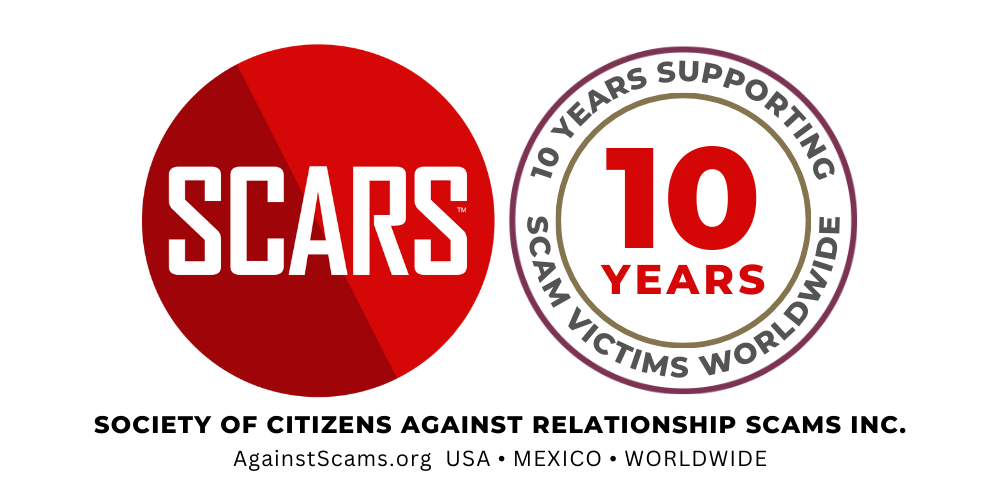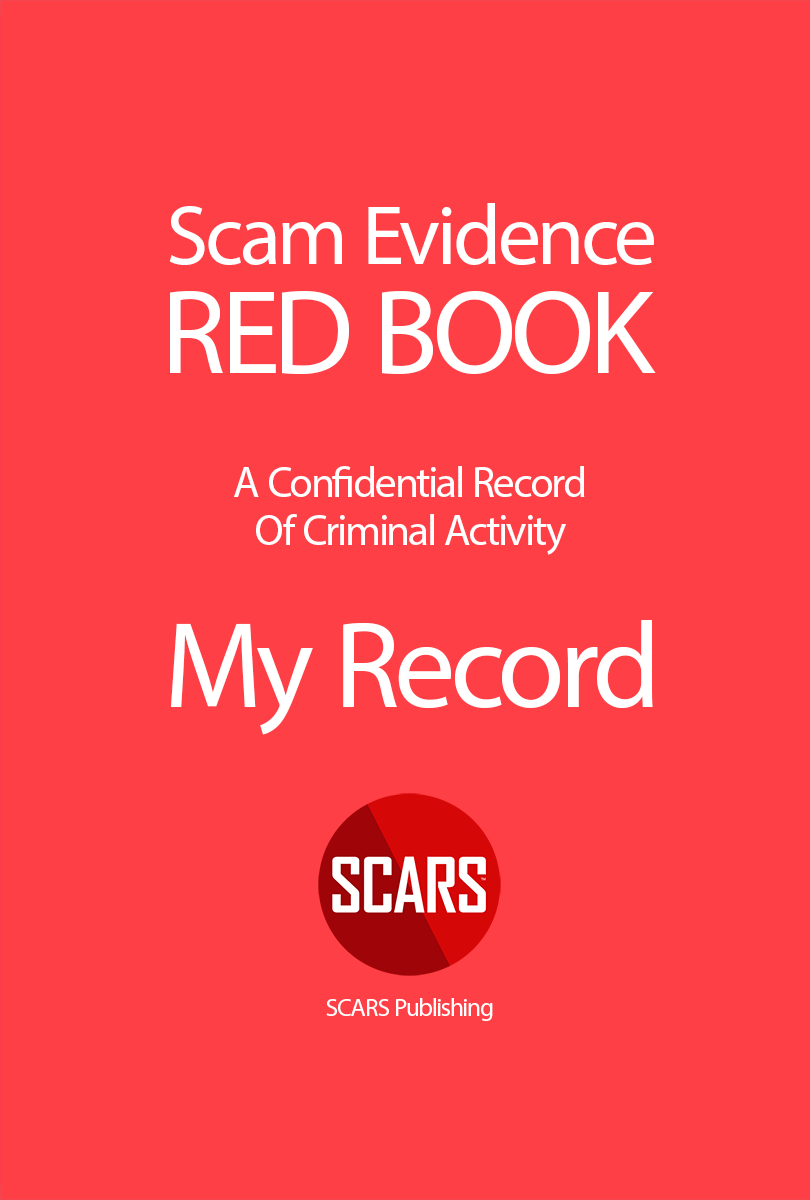
Scam Victims Reporting Scams and Interacting with the Police
A Checklist of what to do Before Speaking with the Police and While You are Reporting Scams!
Helping You Get What Is Possible from the Police and Helping You Consider Your Options!
Key Topics:
-
Create a Crime File
-
Write a Crime Summary
-
Know Your Rights
-
Preparing to Go to the Police and Reporting Scams
The SCARS Police Interaction Checklist For Reporting Scams
It is Vital to Report EVERY Scam
Reporting Scams is one of the problems that all scam victims face. They do not know what to say, how to report the information they have, or what is realistic when initially speaking with the police or government agencies.
The process of reporting scams is not always easy but it is absolutely necessary. What can make it easier is making sure you are prepared when reporting scams and that your expectations are not unrealistic.
The sooner you do this the better because there may be options for recovering your money too!
The secret to reporting scams is to go in prepared, have no expectations, give them what they want, and listen carefully. We also recommend that you go in with a support person who can help you to better understand what the police are telling you – you may be very traumatized.
In addition, reporting is your way to declaring your innocence if anyone ever questions it.
Optional for Scam Victims
SCARS RED BOOK – Your Personal Scam Evidence & Crime Record Book available at shop.AgainstScams.org
Reporting Scams STEP 1: Create A Crime File
After a scam you are shocked and confused, maybe even afraid, so you don’t know how to begin or what to do.
The first step is to start collecting the evidence – because that is what it is. It is evidence of a crime, and online crimes are real crimes! This is the basis for reporting scams.
DIGITAL FOLDER
You will need to create a digital folder on your computer (if you have one.) If this all happened on your phone then you will have to preserve the information in another way.
At this stage, you do not yet know what is going to be needed by the police (until you read the rest before.)
Save all files and photos into the laptop folder to preserve them for the police if they need them for reporting scams, and also so that it is hidden away and out of your sight so that you are not constantly reminded of the pain. Put everything you can find in there and be as complete as possible.
ON YOUR PHONE
If all you used was your phone, you still need to preserve the important parts. There are tricks that help you preserve information in an out-of-the-way place for later use in reporting scams.
One of those tricks is to send YOURSELF messages – either text, or on Facebook Messenger – a message from yourself to yourself, and include what you need to keep. Another is to email it to yourself. You can also take screenshots and save those in your gallery.
PAPER FOLDER
We also recommend that you print what is possible and save it in a paper file folder. This is usually easier to present to the police when reporting scams. Especially try to print out the receipts for bank and money transfer transactions, since these are the most important for the police to have.
THINGS TO KEEP
You should keep all relevant information about the fraud – it is a crime and the evidence might be needed at some point.
Essential Data when Reporting Scams:
- All hard data – banking, money, email, phone, contact info
- All scammer stories – the chats and the dialog – you can copy from most messengers and put it all in a Word or text file
- All transactional documents – documents received from the fraudster, documents for money transactions, and other related documents
- Photos, videos, media, etc. – if the scammer sent it to you, keep a copy in your folders for potential future use or in reporting.
NOTE:
We recommend that you block and cut off all contact with your scammers and any new strangers, but it is important to collect your evidence before you do that – if you can.
Reporting Scams STEP 2: Write a Crime Summary
Start by collecting all relevant documentation concerning the fraud in one file that is kept in a secure location. Then summarize the important parts (not all the dialog or chats, but the core facts that the police will need.) You can create this as a digital file or even handwritten on paper – but be neat and organized. This is going to be the core when reporting scams!
CONTACT SHEET
Create a contact sheet of:
- The perpetrator’s (scammer’s) name(s)
- Physical addresses
- Email addresses
- Phone numbers
- Website addresses
- IP addresses
- As well as any of the fraudster’s purported other identification information
- Any others involved: fake lawyer, fake military, fake family – and their contact info
TIMELINE
Create a timeline of major events, which may span the complete crime from the beginning to the present:
- List significant events in the course of the scam – began, discovery, money transfers/gift card purchases, cryptocurrency transactions too!
- Your actions – money received, loans taken out, money borrowed
- Any important actions by the scammer(s)
- The police will probably not need the transcript of your chats or dialog – it will just get in the way since almost every word was a lie anyway.
THE MONEY
Create a summary of the money or finances involved:
- Money you sent to the scammer(s) – receipts, amounts, who sent to, how sent – what type of money – bank wire, cryptocurrency, or something else
- Money you may have received from anyone that might be connected – who from, amounts, how received
- Did you give any financial information to the scammers?
- Did you give access to banking or other financial accounts to the scammer? What & where
- Was any money sent to anyone in your country?
Reporting Scams STEP 3 – Learn Your Rights
You have rights imparted by federal and, in some cases, state law. Learn about your rights to better prepare yourself.
- For federal victim rights, the U.S. Department of Justice provides information on victim rights at https://www.justice.gov/usao/resources/crime-victims-rights-ombudsman
- For state victim rights, check with your state Attorney General, whose contact information is available at www.naag.org
- If not in the United States do a Google Search for “crime victims’ rights” for your country.
Reporting Scams STEP 4 – Preparing to Go To the Police and Report the Scam
Before you go and file a criminal complaint with your local police there are things you will need to know to properly set your expectations.
- Gather together your evidence and make sure your timeline and money records are well organized, that is what they will be most interested in.
- Understand that the police will not rush out and go to Nigeria or Ghana and arrest the scammers
- They will also, in most cases not be able to recover your money. But if you sent money to someone in your country (such as the U.S. you need to make that very clear.)
- The police are not interested in all the chats or the things the scammer promised you – they were all lies and of no importance in the crime at this point. They matter to you, but they are not factual. If the scammer is ever arrested, then they will matter.
- Understand that you have only two objectives when going to the police:
- Reporting a crime and getting the police report number, since certain benefits come from that
- Regaining control in your life by confronting your fears and doing your duty
- When you walk out of the police, you will not have any closure nor specific satisfaction – it just does not work that way – but it is important
Reporting Scams STEP 5 – Your Attitude
When you contact the police, make sure you physically go into their station to make the report. This is both important for your own psychology and to assure that the report gets taken.
Do not expect anything from the police – but make sure that when you talk to them you use the word “fraud” and NOT “scam.” Fraud is a more comfortable term for them and in truth, they are the same thing.
They are the first responders and all other reporting will depend on their report first.
- Do not go in in a panic, they are not going to save you. However, if you really are afraid, then be sure to ask the police how to obtain a protection order as well.
- Do not go in angry – if you are hostile with them you will get no results and only be more upset when you leave.
- Do not try to hide any information – you have nothing to be ashamed of – you are the victim of a crime.
- Do not expect that they will do anything. Their job is not to leave your town, but once you have the report number then other doors open for you.
Ask a friend or family member to go with you. You do not have to tell them everything, just that you were scammed. But having someone with you will help you make it through this and support you afterward. You can look here for How To Explain To Others
Reporting Scams STEP 6 – Talking with the Police – Filing the Report – Reporting Scams
First, understand that very few police understand relationship scams – they may not be able to understand how the manipulation works and they may think you are mostly to blame – that does not matter. You are there for ONE PURPOSE – to file a report.
When you go in, tell them you want to file a complaint for fraud (don’t use the word scam), and ask if you can speak with a fraud detective. If you are a woman, you can also ask to speak with a woman detective.
MAKE SURE: You get the name and badge number of the officer who takes the report – write it down.
They will likely give you a form to fill in, or they may take the report orally. Be sure you start with just the basics:
- You were defrauded
- You lost money – how much and how it was sent
- You have information – ask them what they would like to know
- If you sent money to someone in your own country (such as a mule) tell them that clearly, and that you suspect it was an “accomplice”
- Give them any information they ask for, no matter how embarrassing – you have nothing to be ashamed of and you are not to blame
If you sent money by bank wire transfer, be sure you have a copy of our article about the INTERPOL money recovery kit – so you can tell them that they should look at the Interpol kit for recovering money sent by wire transfers – here is the article According To INTERPOL It May Not Be Too Late
Next, before you leave ask them to refer the case to the state cybercrime unit – every state in the U.S. has one, and most countries have one too.
About Cryptocurrency:
- It is important that the police understand if crypto was involved.
- Just now, law enforcement around the world is learning how to recover cryptocurrency – so this is a very real possibility
MAKE SURE: you do not leave without getting a report number when reporting scams.
If the officer objects to taking a report, ask to speak with the “Watch Commander,” Police Chief, or Sherrif. Do not accept no for an answer – but do not be hostile or nothing will happen for you. Attitude is everything.
If they object, tell them you need it for your insurance and your taxes – your accountant needs it too. The police routinely take “informational” police reports for this purpose.
MAKE SURE: You ask if there is a victims’ advocate on staff that you can talk to also – they know how to access local government benefits and other assistance you might need. Domestic Abuse advocates understand trauma and can help you also.
Then leave.
CLICK HERE TO LEARN WHY REPORTING MATTERS
Reporting Scams STEP 7 – After Reporting to the Police
Once you have your local police report number – you can use this to obtain any local benefits that may be available. We recommend that you contact your social services department for more information about what may be available.
Do not expect the police to contact you – it is very possible that none of your information can be acted upon, but you never know.
By reporting you are taking control, doing your duty, and helping the government to really understand how widespread this is. It matters.
Reporting Scams STEP 8 – Additional Reporting
After you are done with the local police, you still have more reporting to do. Learn more about this at reporting.AgainstScams.org
- Regardless of your country, we recommend that you report to both the U.S.FTC (https://reportfraud.ftc.gov/#/?orgcode=SCARS)
- Report it on the SCARS website www.Anyscam.com so it will be distributed worldwide
- If you know that the scammer was from a specific country, contact the agency in that country responsible for these crimes – in Nigeria that would be the EFCC – they may not be able to help, but they do make use of the information
- Do not waste your time trying to “expose” the scammer – there are over a billion fake profiles. All it will do is frustrate you.
Reporting Scams STEP 9 – Aftermath
After this is all done, it is time to turn your back on it and get professional help – to help you to recover from this.
You have a choice for help:
- Join a SCARS Scam Victim Support Group – visit support.AgainstScams.org
- Local Trauma Counseling or Therapy – do not be ashamed to ask for help! The only shame is not asking for help. Here is a directory of Trauma Counselors & Therapists: counseling.AgainstScams.org
This seems like a lot to deal with after your scam, and reporting scams to the police but take it one step at a time. Focus on getting organized using our checklist.
Learn more about how to follow up with the police here!
After this, your only job is to recover!
SCARS Support & Recovery
- SCARS INSTITUTE FREE Scam Survivor’s School for Your Recovery • www.SCARSeducation.org
- SCARS Support & Recovery Program For Scam Victims
- Join a Free Safe & Confidential SCARS Support & Recovery Group Now
- SCARS Self Help Books
- How Scam Victims Can Maximize Support Groups Benefits
- If you are looking for local trauma counselors please visit counseling.AgainstScams.org or join SCARS for our counseling/therapy benefit: membership.AgainstScams.org
- If you need to speak with someone now, you can dial 988 or find phone numbers for crisis hotlines all around the world here: www.opencounseling.com/suicide-hotlines
Important Things For Scam Victims To Know
- Importance Of Starting Off Right For New Scam Victims
- Importance Of Journaling For New Scam Victims
- Importance For Scam Victims Of Support & Recovery Group
- Importance Of Learning For Scam Victims Recovering
- Importance Of Trauma Therapy For Scam Victims
- Importance Of Scam Victims Avoiding The Vigilante Trap
- SCARS 3 Steps For New Scam Victims
- Every New Scam Victim Needs To Understand What To Do Next!
- Scam Victims Reporting Scams And Interacting With The Police
- Essential Information for New Scam Victims on SCARS RomanceScamsNOW.com
- Learn More on SCARS ScamsNOW.com
SCARS Resources
- Register for the SCARS Institute FREE Scam Survivor’s School at SCARSeducation.org
- More Info For New Victims of Relationship Scams newvictim.AgainstScams.org
- Subscribe to SCARS Newsletter newsletter.againstscams.org
- Sign up for SCARS professional support & recovery groups, visit support.AgainstScams.org
- Join our Scam Survivors United Chat, Education & Discussion Group facebook.com/groups/scam.survivors.united
- Find competent trauma counselors or therapists, visit counseling.AgainstScams.org
- Become a SCARS Member and get free counseling benefits, visit membership.AgainstScams.org
- Report each and every crime, learn how to at reporting.AgainstScams.org
- Learn more about Scams & Scammers at RomanceScamsNOW.com and ScamsNOW.com
- Scammer photos ScammerPhotos.com
- SCARS Videos youtube.AgainstScams.org
- Self-Help Books for Scam Victims are at shop.AgainstScams.org
- Donate to SCARS and help us help others at donate.AgainstScams.org
- Worldwide Crisis Hotlines: https://blog.opencounseling.com/suicide-hotlines/
• SCARS Scam Psychology Guides & Knowledge: ScamPsychology.org

















Very detailed checklist to get the crime reported. I got inspired and followed up with my local FBI office, after reading this article. Now I am awaiting on an update on my case. I am specifically interested that the money mules(accomplices) involved get traced, even if I don’t get any money back.
After reporting to the local police, I reported my fraud case to IC3 (FBI), FTC, Secret Service, and my bank. Not expecting any results but will be trying to follow up with at least my local police.